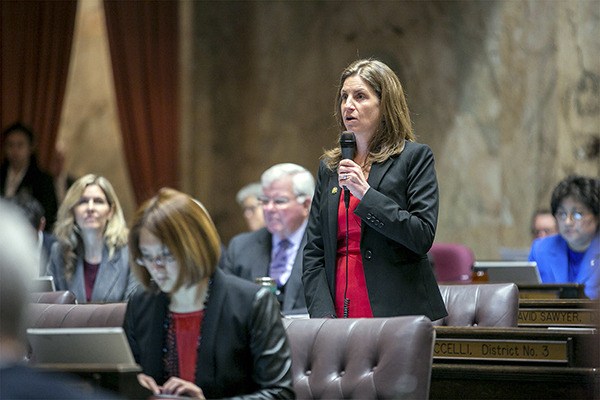Rep. Tana Senn’s (D-Mercer Island) bill to address the gender wage gap passed the House on Feb. 3 with bipartisan support and a 56-41 vote. She also won the “Legislator of the Week” award for her work to ensure equal pay for women.
Her bill, the Equal Pay Opportunity Act (HB 1646), would ban employers from retaliating against employees for discussing wages and salaries and prevent the use of pay secrecy policies.
It’s not about pay transparency and publicizing wages, but shining a light on the pay gap issue and allowing women to find out if they’re being underpaid, Senn told the Reporter.
“America is a nation founded on the ideal that all of us are created equal,” she said. “There are various reasons why women are paid differently than men (because they don’t negotiate or choose lower-paying fields), but even if you eliminate those, there’s an inexplicable difference in pay.”
Her bill is an amendment of an existing equal pay law that was passed in 1943. The state’s equal pay law has not had major updates since it was passed.
On average, a working woman in Washington earns just 77 percent of her male counterpart, even when their seniority, experience and education are comparable. This income disparity is dramatically worse for women of color, who could make as low as 46 cents on the dollar. In 2012 alone, the wage gap resulted in an $18,650 loss for black women and a $24,111 loss for Latinas.
“Whether it’s conscious bias or unconscious bias, it is there,” she told the Reporter. “If you want to have equal pay and you don’t even know that you’re being paid unfairly, then how can you attack the problem?”
This discrepancy has a cumulative impact that affects women and families of all ages, Senn said. Older women who have been underpaid their whole lives end up with less in their savings, Social Security, 401ks and pensions. They are twice as likely to live in poverty than senior men, Senn said.
“It affects everyone from my 10-year-old, who is well aware of the wage gap … all the way up to senior women,” she said.
More than 20 states already have laws preventing pay secrecy policies, and President Barack Obama has also taken steps to try and close the wage gap. California and Oregon passed similar laws in 2015, allowing employees to have open discussion and inquire about their own pay, as well as their co-workers’ pay, without retaliation.
“Information is power,” Senn said in a statement. “As long as women employees are kept ignorant of salary differences, the discrimination can persist. That has to change.”
Equal pay is not just a women’s issue, but also an economic issue, she said. Washington’s middle-class families would be lifted up by pay equity for all of Washington’s working women and mothers.
“If you put more money in [women’s] paychecks, it usually goes directly into the economy,” Senn said.
The State House of Representatives approved HB 1646 in 2015 but it did not reach the floor of the state Senate for a vote. The bill again goes to the Senate for further action.
Senn said she is sending a bipartisan letter to Sen. Michael Baumgartner (R-Spokane), chair of the Senate Commerce and Labor committee, to ask for a hearing and voting opportunity.


